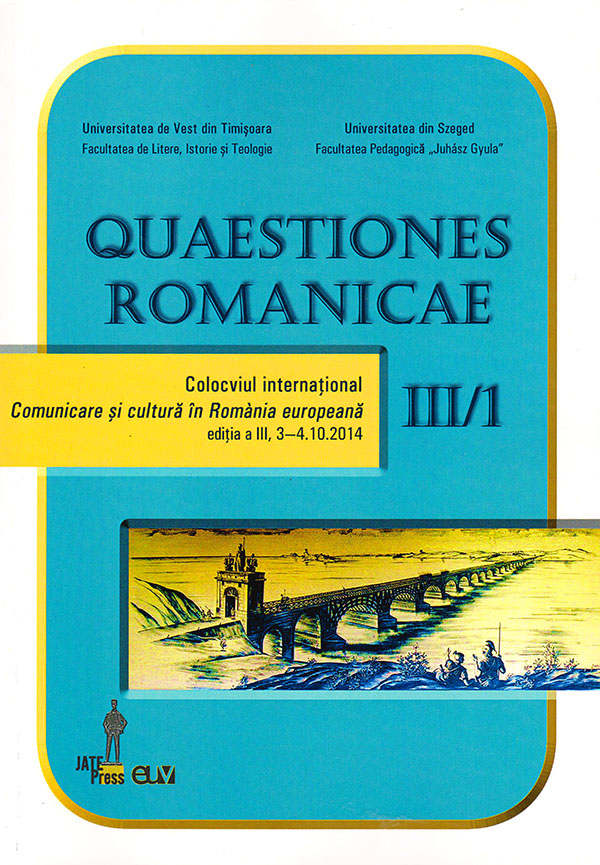La storia e la politica nel pensiero di Alessandro Manzoni
Abstract: (The History and the Political Thinking by Alessandro Manzoni) Manzoni is well known in Italy especially for his historical novel I promessi sposi [The Betrothed], 1827, in which the author places a fictional story within the historical context of the Lombardy of the seventeenth century, during the Spanish domination. The novel, with a strong Catholic inspiration, reveals a conception of history dominated by the errors of men, but ultimately governed by the intervention of the divine providence. The interest of Manzoni for the History was not limited to the composition of the novel; during his life, he explored the particular moments of history, not only motivated by an interest in the research, but above all by the desire to find its moral significance. Another theme of his work is that of the policy, as determined by the work of the divine providence. The works in which the writer addresses these issues are Discorso sopra alcuni punti della storia longobardica in Italia (1822) [Discourse on some points in Longobard history in Italy], Storia della colonna infame (1840-42) [History of the infamous column] and, in the end, the essay La Rivoluzione francese del 1789 e la rivoluzione italiana del 1858. Osservazioni comparative (posthumous, 1889) [The French Revolution of 1789 and the Italian revolution of 1858. Comparative observations]. Alessandro Manzoni stands for the rejection of preconceived judgments; he refuses to consider the history as a conflict between opposing blocs (such as ‘good’ versus ‘bad’); his is a continuing search for the individual responsibilities of the protagonists, who are judged not according to the membership of a particular party or to the result of their work, but according to the moral value of individual choices. In the historical view of Manzoni dominates the Christian concept of the free will and the personal responsibilities, which are always based on the rules of morality. Even in politics, which is always the art of compromise and mediation, choices must be made and evaluated according to the morality and the sense of the responsibility of the protagonists. Their guidelines are dictated by the writer in compliance with the laws of Christian morality. As a result, the work of manhood, in history and in politics (which are the fields of its work) is not predetermined by a providential drawing but only by individual choices and civil morality.
Keywords: history, novel writer, Christian morality, politics.
Riassunto: L’interesse di Manzoni per la Storia non era limitato alla composizione del romanzo; nel corso della sua vita egli ha approfondito dei momenti particolari della Storia, motivato non solo dall’interesse nella ricerca, ma soprattutto dal desiderio di trovare un suo significato morale. Un altro tema della sua indagine è quello della politica, in quanto determinata dall’operato dell’uomo. Le opere nelle quali lo scrittore affronta tali temi sono il Discorso sopra alcuni punti della storia longobardica in Italia (1822), la Storia della colonna infame (1840-42) e, in fine, il saggio La rivoluzione francese del 1789 e la rivoluzione italiana del 1858. Osservazioni comparative (postumo, 1889). Alessandro Manzoni si distingue per il rifiuto di giudizi preconcetti; egli si rifiuta di valutare la Storia come un contrasto tra blocchi contrapposti (ad esempio: ‘buoni’ contro ‘cattivi’); la sua è una continua ricerca delle responsabilità individuali dei protagonisti, i quali vengono giudicati non secondo l’appartenenza ad un determinato partito o secondo il risultato del loro operato, ma in base al valore morale delle scelte individuali. Nella visione storica di Manzoni predomina il concetto cristiano del libero arbitrio, della responsabilità personale basata sulle regole della morale. Anche nella politica, che è sempre l’arte del compromesso e della mediazione, le scelte vanno effettuate e valutate secondo la moralità ed il senso di responsabilità dei protagonisti. La linea guida è dettata, per lo scrittore, dal rispetto delle leggi e della morale cristiana. Di conseguenza, l’operato dell’uomo, nella Storia e nella politica (i campi del suo operato) non è predeterminato da una visione provvidenziale, propria di chi crede in Dio e nel suo intervento, ma solo dalle scelte individuali e dalla morale civile.
Parole chiave: storia, romanziere, morale cristiana, politica.
